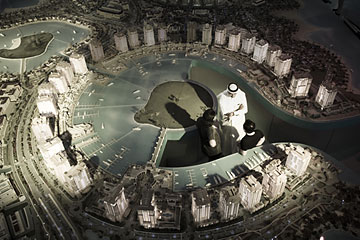
Arealestate sales office for Pearl-Qatar, a man-made-island project
(3 of 5)
Sports, too, serve Qatar's strategic goals. The Qatar Foundation has sponsored the FC Barcelona soccer team since 2010. Two years ago, Qatar elbowed aside sporting heavyweights the U.S. and the U.K. for the right to host soccer's 2022 World Cup. "By 2022 pretty much every person on the planet is going to be aware of Qatar," says Salman Shaikh, director of the Brookings Doha Center's Middle East program. "So it really creates a sense that it is a power to be reckoned with in the region."
Meanwhile, Qatar's sovereign wealth fund, with an estimated $100 billion in assets, has embarked on a worldwide shopping spree. It snapped up the U.K. department store Harrods for a reported $2.2 billion, owns 95% of the Shard, a $2.4 billion real estate development in London, and has bought the Paris Saint-Germain soccer team. It has stakes in iconic brands such as Volkswagen, Tiffany, Louis Vuitton and Credit Suisse. The Emir is also considering a deal to acquire the AC Milan soccer team from embattled former Italian Prime Minister Silvio Berlusconi for a reported $650 million.
Qatar's investment strategy is designed to project an image that appeals to its Western allies. It doesn't always work. A recent Qatari proposal to invest $65 million in Paris' marginalized--and Muslim-dominated--suburbs provoked a vitriolic outcry in the French press. (The far right's Marine Le Pen dubbed the initiative a "Trojan horse.") Qatar's successful bid for the World Cup--which will be played in a desert country in the summer--is regularly hit with accusations of bribery and foul play. Officials with Qatar's sports federation have denied any improprieties.
Why does Qatar seem to have such a Napoleon complex? One word: "Kuwait," says David Roberts, deputy director of the Doha branch of RUSI. "Iraq's 1990 invasion of Kuwait demonstrated that anonymity is not a good thing. So if you can be known as that strangely powerful country striving--in a good way--on noble issues like education, regional peace and stability, that sounds like a good way to stand out."
The Flag Bearer
In the early days of the Arab spring, al-Jazeera made it very clear where its sympathies lay. Within a week of the Libyan uprising, anchors on al-Jazeera delivered news updates on Libya against a backdrop of the country's pre-Gaddafi flag, which had been adopted as a standard of the rebellion. The network took a similar position in its coverage of the events in Syria, marking its preference with displays of the green, white and black emblem of the opposition. Those symbolic gestures opened Qatar to criticism. Why was al-Jazeera treading so lightly in its coverage of human-rights issues in Qatar? Or in neighboring Bahrain, where Qatari troops helped quash a popular revolt?
